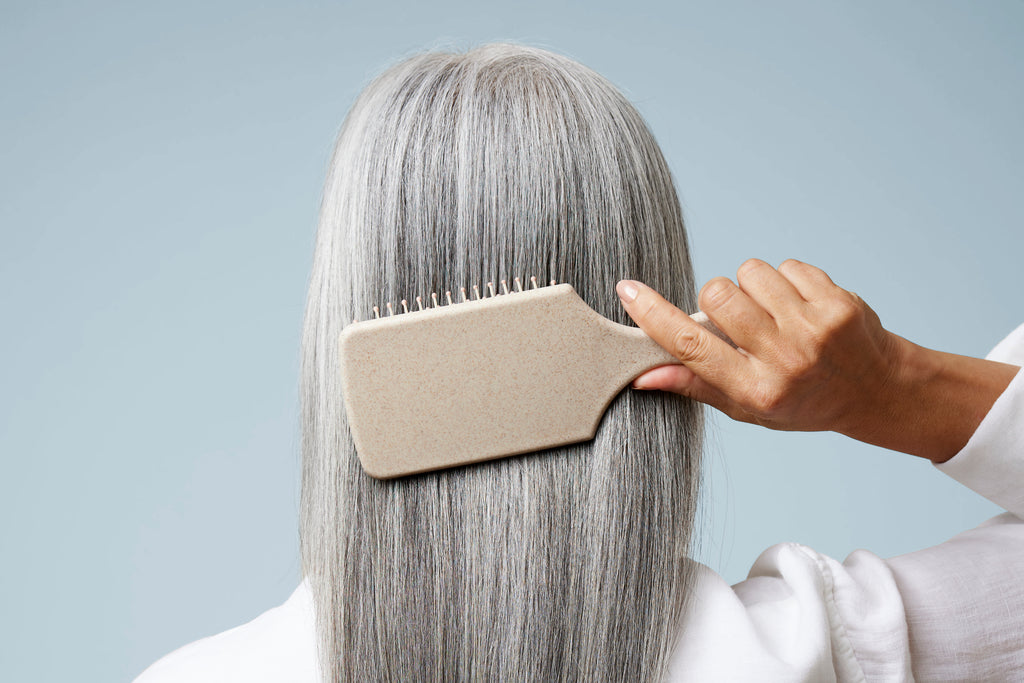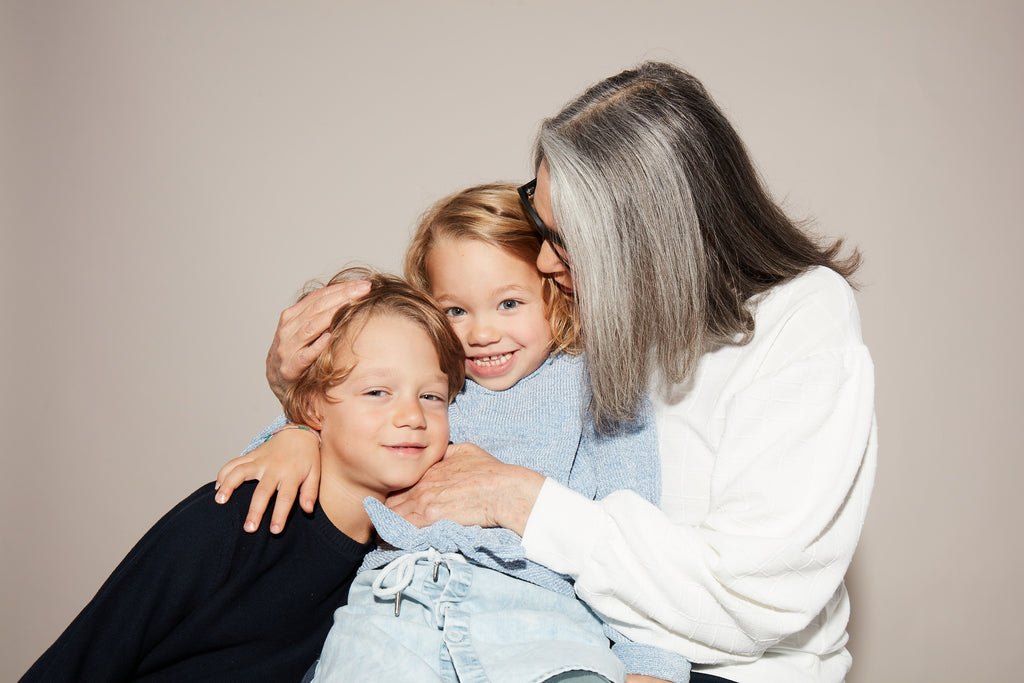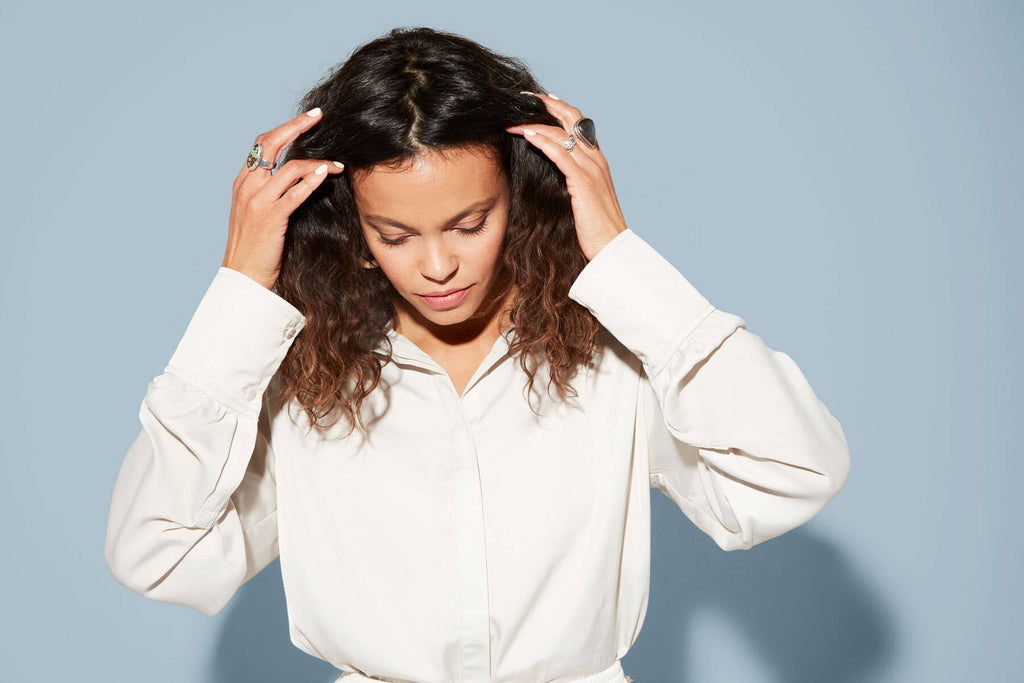Often called “The Change,” menopause is a natural part of aging. You might associate it with side effects like hot flashes and the end of your period, but it marks a time of transition for your hair, too. That’s right: Menopause can change your hair, from its natural texture to its thickness and density.
Whether you’re already in this stage of life or are prepping for what’s ahead, it’s natural to feel uncertain or have questions. To help you navigate all this newness confidently, we spoke with our friend Sally Mueller, co-founder of menopause wellness brand Womaness, about what menopause is really like, how it impacts your locks and tips for maintaining strong, healthy hair.
What happens to your body during menopause?
Menopause is all about hormones. Hormones are responsible for different functions and processes in our body, and as we age, we produce less of certain ones. Around age 50, a person’s ovaries start to make much smaller quantities of the hormones estrogen and progesterone. This kicks off a period of change in the body—the time of life known as menopause.
Though this whole big transition is usually summed up as “menopause,” it actually involves three stages:
Perimenopause happens first—it’s the transition phase into menopause. It usually lasts anywhere from seven to 10 years, so symptoms can begin for people around age 40. “In perimenopause, your hormones are fluctuating,” Sally explains. “This is when you start to notice changes in your body, hair and skin.” As your ovaries gradually stop working and your estrogen levels go up and down, it’s common to experience symptoms like irregular periods, insomnia, hot flashes and mood swings. You may feel like you’re riding a hormonal rollercoaster, and that’s totally normal.
Menopause is when your period stops. When you haven’t had a period for 12 consecutive months, you’re officially in menopause. Sally explains, “Menopause itself is more of a marker, a moment in time, that leads you into the next phase of your life: postmenopause.”
Postmenopause is the phase you enter after menopause and stay in for the rest of your life. (As Sally puts it: “You’re in menopause for a third of your life. A lot of women don’t realize that!”) The good news is it’s usually a much smoother ride from here: in postmenopause, the symptoms you experience leading up to menopause tend to ease up or stop altogether.
Now that we’ve covered the basics of menopause, let’s talk more about the hair-related effects.

How does menopause affect your hair?
Estrogen plays a pretty important role in hair health, which is why you may notice changes. “Estrogen is a hydrating hormone for your body,” Sally explains. “It impacts so many things, from hair growth to the production of sebum, the natural oils that keep your hair and scalp hydrated.”
Common menopause hair changes:
- Hair loss
- Hair thinning/loss of volume
- Dry, dull hair
- Dry, sensitive scalp
- Weaker, brittle strands (more prone to breakage)
- Texture changes
“As estrogen drops in perimenopause, a lot of women see their hair start to transform,” Sally says. “Maybe they notice it’s thinning out, or it’s drier than usual. I’ve had friends who have gone from straight hair to curly hair.”
Hair loss and hair thinning are two of the most common changes. According to Sally, “These are some of the top issues we hear from women. You may also get those fine baby hairs in the front, similar to pregnancy, from when you lose your hair and it starts to grow back.”
With all these new challenges, “It’s a good time to revisit your hair care routine,” Sally says. “Your days of using any old shampoo and conditioner may not cut it anymore. You really have to invest in quality products for your hair and scalp.”

Your menopause hair care plan
Menopause affects everyone differently, so there’s no one-size-fits-all approach. However, based on what changes you’re experiencing, here are some ways to adapt your routine to meet your hair’s new needs.
Crank up the volume
If your hair’s thinning out, look for volumizing and thickening hair products to help restore density and body. Treatments that include hydrolyzed rice protein and amaranth can help increase hair volume and thickness. Try styling products that add texture to give hair a fuller look.
Max out the moisture
“Hydration is absolutely essential,” Sally emphasizes. If you’re dealing with dryness, try swapping your old formulas for more hydrating ones, or adding a deep conditioning treatment to your routine. Maintaining a healthy moisture level will help your strands continue to shine.
You may also want to rethink your shampoo schedule—washing too often can dry your hair out further and make it more susceptible to breakage. “I’ve stopped washing my hair every day because it gives my hair more body,” Sally shares. “And frankly, my hair looks better when it’s not washed!”
Handle with care
During menopause, your strands become more delicate. Styling gently is important to avoid breakage and retain length. This could look like switching to a softer brush or comb, using a detangling aid or swapping heat styling for air drying. “I’m careful about how intensely I blow dry my hair or use hot tools like curling irons, which can dry out your hair,” Sally explains. “Letting your hair dry naturally as often as possible can help protect it. It’s best not to dry hair to the bone because it’s already lost so much hydration due to menopause.”
Get to know your texture
If the shape of your strands changes, you’ll need to do some learning about the needs of your new hair type. (Or take our quiz and we’ll find a hair care routine match for you!) One of the best ways to simplify your routine is to use products designed specifically for your hair type and texture (e.g., smoothing products for frizz-prone strands).
Step up your scalp routine
A healthy scalp is essential for healthy hair. Keeping it clean and moisturized can go a long way to support your follicles. Beyond the basics like shampooing thoroughly and using sun protection, incorporating a scalp care routine—whether it’s a scrub to help clear buildup or serums to stimulate growth—can help with hair volume, strength and hydration.
Consider adding supplements
Certain supplements can help support hair and scalp health. Sally advises choosing a supplement with clinically proven ingredients that are backed by research. “It can also help to see a functional doctor who understands natural solutions to help guide you toward the right options.”











